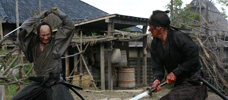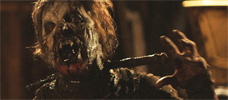Reviews
Jûsan-nin no shikaku
Takashi Miike
Japan, 2010
Credits
Review by Victoria Large
Posted on 30 April 2011
Source Magnet Releasing 35mm print
Categories The 2011 Independent Film Festival Boston
Takashi Miike’s new samurai epic 13 Assassins, based on Kudo Eichi’s 1963 film of the same name, is a film that action fans are going to have an easy time falling for. There’s something deliciously old school about its sprawling, sure-footed storytelling and classic guys-on-a-mission plot. If Miike, notorious for the likes of 1999’s genre-bending shocker Audition, is going to break through to a larger audience, it may well be with this film. That’s not to say that the film doesn’t live up to Miike’s reputation for being gruesome: it opens with an unromantic depiction of hara-kiri and remains unflinching (and at times exuberant) in its depiction of violence. I also don’t mean to imply that the film is simplistic: to the contrary, its characters are made to grapple with the troubling underpinnings of the codes that they live by, and the film gives viewers philosophical strands to mull over throughout.
The villain is Lord Naritsugu, the shogun’s vicious half-brother. He’s the kind of guy who hacks off peasant women’s limbs without a second thought and uses human targets when he practices archery. Since this is a revenge picture, Naritsugu’s cruelty infuses the film with a great sense of urgency: he murders with impunity, and we are aghast. Yet as unabashedly evil as the character is, actor Gorô Inagaki does give him intriguing dimension, starting with Naritsugu’s regal bearing and sick charisma. Privileged and protected, Naritsugu is convinced that his sadistic actions are his natural right, so he treats torture and murder as favorite games. He makes for a fascinating figure onscreen, serving as more than just a target for the underdog assassins of the film’s title.
Veteran actor Kôji Yakusho plays Shinzaemon Shimada, the samurai recruited to find a way to take Naritsugu out before he is able to attain greater power and do untold damage to his people. Feeling blessed by the opportunity for “a noble death” at a time when samurai culture is on the wane, Shinza promises to complete the task “with magnificence” and goes about assembling his underdog team of assassins. Yakusho plays Shinza with a blend of determination and humanity, creating a powerful foil for the coldblooded nastiness of Naritsugu. He receives able support from the other assassins, notably Takayuki Yamada as Shinza’s nephew-turned-protégé Shinrouko and Masataka Kubota, who plays the youngest of the assassins.
Special mention must be given to Yôsuke Iseya, who plays Koyata, the only assassin who is not a samurai. Koyata turns up after the mission is already underway, caught in a net that’s hanging from a tree. A scruffy man who is described as a “raccoon goblin” upon his initial appearance, Koyata is an underdog among underdogs, a one-eared wild man who provides a fresh perspective on the strict codes of honor that govern Shinza’s other men. With performances like this, and a great rivalry standing between Shinza and Naritsugu’s right-hand man Hanbei, 13 Assassins avoids getting lost in the intricacy of its planning montages or the size of its cast.
Miike has made a truly gorgeous film, one that deftly transports viewers to Japan’s feudal era and fills the eye with images that are nothing if not cinematic: an overmatched band of warriors galloping hard through the rain; an army of men charging forward, their identical helmets creating a surreal vision of war; a lone samurai standing steadfast with his sword. This is an action of film of high style that will best be enjoyed on the big screen, one that cries out for a darkened room and a lively audience.
The film’s staggering violence ensures that it will not be for everyone, but Miike’s approach is not glamorous or cartoony. Though his assassins are given appealing “hero” moments and opportunities to exhibit grace and skill as fighters, we also see some of them in blood-spattered shock or mud-spattered death throes, with realistic pain resulting from the film’s admittedly fantastical premise, that of thirteen assassins taking on the army of men who protect Naritsugu.
As 13 Assassins draws to its conclusion, we are left not with a sheer sense of triumph or tragedy, but rather with questions about what it means to live and die with honor, and about the nature of the ideals and individuals that we choose to serve. Miike’s film builds momentum into its lengthy final showdown, but in the end the director takes welcome time to reflect. He also indulges in an intentional lapse in logic regarding the fate of one of his characters, a surprise magical realist touch that I welcomed with a grin. It isn’t just that Miike earns the indulgence: the wrinkle fits just right with the themes of the film and its age-old questions about how to best live one’s life. In the end, Miike provided me with a rare sensation indeed: the experience of watching a new work that already feels like a masterpiece.
More The 2011 Independent Film Festival Boston
-

13 Assassins
2010 -

Ivan & Ivana
2011 -

Being Elmo: A Puppeteer’s Journey
2011 -

Bellflower
2011 -

Convento
2011 -

Cure for Pain: The Mark Sandman Story
2011 -

The Trip
2010 -

El Bulli
2010 -

Submarine
2010 -

Stake Land
2010 -

Another Earth
2010 -

If a Tree Falls
2011 -

Terri
2011 -

The City Dark
2011 -

Littlerock
2010 -

Superheroes
2011 -

Hot Coffee
2011 -

Conan O’Brien Can’t Stop
2011
We don’t do comments anymore, but you may contact us here or find us on Twitter or Facebook.



